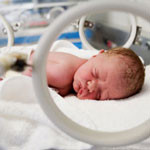Infant Asphyxiation at Birth: Leading Cause is Human Error
 A recent study conducted in Norway found that human error is the number one cause of fetal brain asphyxia during birth. Defined as a prolonged period of oxygen deprivation to the baby, infant asphyxia often carries devastating consequences for the child, including irreversible brain damage and death.
A recent study conducted in Norway found that human error is the number one cause of fetal brain asphyxia during birth. Defined as a prolonged period of oxygen deprivation to the baby, infant asphyxia often carries devastating consequences for the child, including irreversible brain damage and death.
The findings stress the importance of diligent prenatal and delivery room care, whether carried out by midwives, surgeons, nurses or other health care providers. The researchers based their study on 161 lawsuits filed over complications with infant asphyxiation at birth. The cases were filed between 1994 and 2008. In the complaints, 96 babies suffered brain damage and 54 infants died from oxygen loss.
Causes for lack of oxygen during childbirth
The results, which were published in the journal Acta Obstetricia et Gynecologica Scandinavica, found that human mistakes were the most common cause of infant brain asphyxia. Researchers said that 50 percent of the asphyxia cases were due to inadequate fetal monitoring, four percent were attributed to lack of clinical knowledge, 11 percent were caused by failure to follow proper guidelines and 10 percent were caused by the absence of senior medical staff. Another four percent were due to mistakes in drug administration.
“In most compensated cases, poor fetal monitoring led to an inadequate supply of oxygen to the infant,” said lead study author Dr. Andreasen of Nordland hospital. “Training for midwives and obstetricians, along with high-quality audits, could help to reduce claims for compensation after birth asphyxia.”
The 15-year study investigated hospital records, medical expert assessments, along with court decisions in the claims that were awarded compensation. Prior research conducted by the same team found that asphyxia was the leading cause for compensation, with up to 25 cases in Norway filed each year.
Other potential causes of brain asphyxia during birth may include:
- Prolonged or complicated vaginal delivery
- The fetal airway is not developed properly or is blocked
- Too little oxygen in the mother’s blood before or during delivery
- Placenta separates from the uterus prematurely
- Umbilical cord problems
- Infection in either the mother or baby
- Mother suffers from low blood pressure
- Fetal blood cells cannot carry sufficient oxygen (anemia)
Effects of oxygen deprivation during birth
Fetal monitoring before and during birth is crucial to determine if the baby is in distress. Changes or rapid decelerations in heart rate are normally one of the first symptoms of infant asphyxiation, though increased acid levels in the blood is another potential sign. Oftentimes, an emergency C-section is warranted to minimize the duration of oxygen loss to the fetus.
After childbirth, doctors will examine the child’s Apgar scores to evaluate the infant’s heartbeat, reflexes, color, muscle tone and respiration. A brain asphyxia diagnosis may also be made if a newborn displays symptoms of digestive and respiratory system problems, poor muscle tone, seizures, or low blood pressure.
Depending on the extent and severity of asphyxia, treatment may entail medications to help stabilize the baby’s blood pressure and breathing and assisted ventilation. In other cases, medical staff may have to resort to an extracorporeal membrane oxygenation (ECMO) – which delivers oxygen to the baby’s brain and body by acting as an artificial lung. Infants who suffer serious brain damage may go on to develop cerebral palsy and other debilitating life-long conditions.


